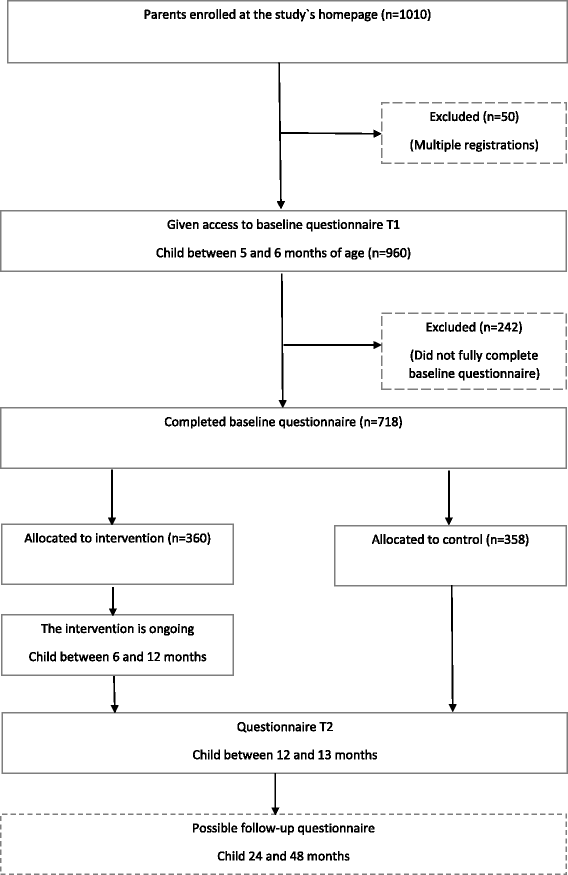Early food for future health: a randomized controlled trial evaluating the effect of an eHealth intervention aiming to promote healthy food habits from early childhood
- PMID: 28931384
- PMCID: PMC5607575
- DOI: 10.1186/s12889-017-4731-8
Early food for future health: a randomized controlled trial evaluating the effect of an eHealth intervention aiming to promote healthy food habits from early childhood
Abstract
Background: Childhood overweight and obesity is a global public health challenge. Primary prevention initiatives targeting parents have been called for to encourage a positive feeding environment and healthy eating habits that may lay a good foundation for future health. At the same time, there is a need for interventions which combine accessibility and scalability with cost effectiveness. Today's parents are extensive Internet-users, but only a few randomized controlled trials have investigated the use of Internet to promote healthy eating habits in early childhood. In Early Food for Future Health we have developed and will evaluate an Internet-based tool for parents of children between 6 and 12 months, aiming to increase knowledge about infant nutrition and foster protective feeding behavior.
Methods: During springtime 2016, parents of children aged between 3 and 5 months were recruited through Norwegian child health centres and announcements on Facebook. After completing the baseline questionnaire, 718 parents were individually randomized to intervention- or control group. The intervention group received monthly emails with links to an age-appropriate web-site when their child was between 6 and 12 months. The control group received ordinary care from the child health centres. The data-collection is ongoing. All participants will be followed up at ages 12 and possibly 24 and 48 months, with questionnaires relating to eating behaviour and feeding practices, food variety and diet quality.
Discussion: Providing guidance and counseling to parents of infants is an important task for health authorities and the public child health services. Early Food for Future health is an intervention focusing on promoting early healthy food-habits which may prevent childhood overweight and obesity. If proven to be effective, Early Food for Future Health can be used by parents and public health nurses for supplementary guidance on feeding practices and diet. This study has the potential to provide greater insight and understanding regarding early parental feeding practices, child eating behavior and the development and efficacy of Internet-based public health interventions.
Trial registration: ISRCTN13601567 .
Keywords: Child eating behavior; Childhood overweight and obesity; Infant; Parental feeding practices.
Conflict of interest statement
Ethics approval and consent to participate
The protocol for the present study was notified to the Norwegian Social Data Services, Data protection Official for Research, 17/08/2015; reference 43,975. Informed consent was obtained from all participants on the study’s homepage [49] when they chose to sign up for the study.
Consent for publication
Not applicable.
Competing interests
The authors declare that they have no competing interests.
Publisher’s Note
Springer Nature remains neutral with regard to jurisdictional claims in published maps and institutional affiliations.
References
-
- Wang Y, Lobstein T. Worldwide trends in childhood overweight and obesity. Int J Pediatr Obes. 2006;1(1):11–25. - PubMed
-
- de Onis M, Blossner M, Borghi E. Global prevalence and trends of overweight and obesity among preschool children. Am J Clin Nutr. 2010;92(5):1257–1264. - PubMed
-
- Strauss RS, Pollack HA. Social marginalization of overweight children. Arch Pediatr Adolesc Med. 2003;157(8):746–752. - PubMed
-
- Reilly JJ, Kelly J. Long-term impact of overweight and obesity in childhood and adolescence on morbidity and premature mortality in adulthood: systematic review. Int J Obes. 2011;35(7):891–898. - PubMed
Publication types
MeSH terms
LinkOut - more resources
Full Text Sources
Other Literature Sources
Medical


